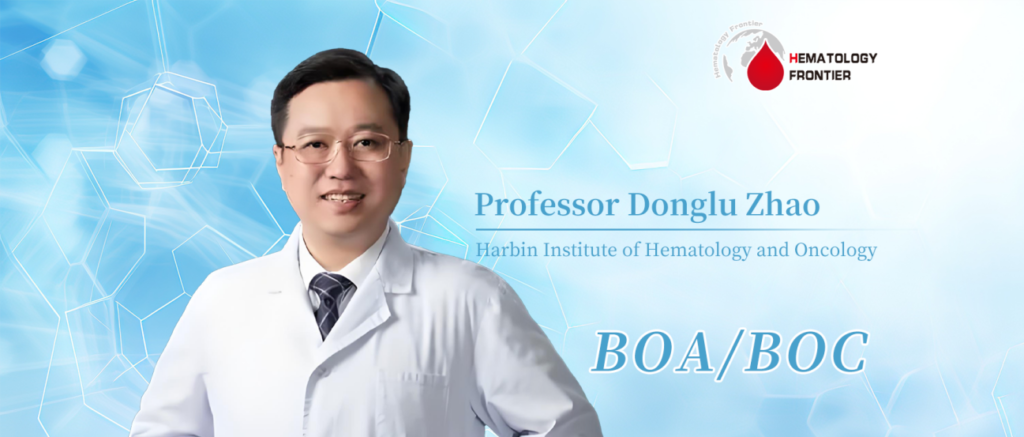
Editor's Note: From July 5th to 7th, the "2024 Annual Progress Seminar in Clinical Oncology in China (BOC)," hosted by the Chinese Society of Clinical Oncology (CSCO), was held in Guangzhou. The conference invited numerous domestic oncology experts to highlight the "2023 Annual Progress in Clinical Oncology in China" selected by CSCO. Additionally, it focused on the theme of the 2024 ASCO Annual Meeting, "The Art and Science of Cancer Care: From Comfort to Cure," and discussed and interpreted major research presented at ASCO. To gain in-depth insights into the relevant content and trends, "Oncology Frontier - Hematology Frontier" conducted an exclusive interview with Professor Donglu Zhao from the Harbin Institute of Hematology and Oncology, who provided an excellent analysis of these topics.Oncology Frontier – Hematology Frontier: The field of hematologic oncology in China achieved numerous advancements and breakthroughs in 2023. Could you provide a brief commentary on these developments?
Professor Donglu Zhao: Over the past year, the field of hematologic oncology in China has made significant progress in the treatment of diseases such as lymphoma, multiple myeloma, and leukemia. Numerous new drugs have been approved and launched, and many studies have been reported at major international academic conferences, making China’s voice heard globally. Personally, I am particularly focused on the treatment advancements for T-cell lymphoma. Unlike B-cell lymphoma, there are fewer treatment options and new drugs for T-cell lymphoma. However, the incidence of peripheral T-cell lymphoma (PTCL) in China is significantly higher than in Western countries, which has driven our dedicated efforts towards developing new drugs for PTCL. Recently, we’ve made considerable progress, with new drugs like JAK1 inhibitors and EZH1/2 inhibitors showing breakthroughs in clinical research. Notably, in June this year, China’s independently developed Class I new drug, the highly selective JAK1 inhibitor, ruxolitinib, was officially approved for the treatment of adult patients with relapsed or refractory peripheral T-cell lymphoma (r/r-PTCL). We hope this approval will bring longer survival to more Chinese PTCL patients.
Oncology Frontier – Hematology Frontier: The 2024 ASCO conference recently concluded. Can you analyze the research progress in the field of hematologic oncology from the 2024 ASCO?
Professor Donglu Zhao: Although hematologic oncology is not the main focus in the broader field of oncology, it has led trends in cancer treatment and pioneered many therapies, such as monoclonal antibody therapy. In targeted and immunotherapy, especially CAR-T therapy, bispecific antibodies, and ADCs, breakthroughs were first achieved in hematologic oncology before being applied to other solid tumors. At this year’s ASCO conference, there were several advancements in hematologic oncology. Notably, the advancement of CAR-T therapy in the treatment of multiple myeloma (MM) was particularly striking. Research showed that the earlier use of CAR-T therapy in high-risk MM patients achieved impressive efficacy and prolonged long-term survival. Additionally, for high-risk and refractory MM patients, new drugs combined with treatment regimens brought better efficacy and breakthroughs. Although these new drug combinations may be limited in China (due to lack of insurance coverage or being unlisted), this has spurred domestic pharmaceutical companies and research centers to develop related drugs, leading to more progress and benefits for domestic hematologic oncology patients.
Oncology Frontier – Hematology Frontier: China has made many advancements in hematologic oncology in recent years and has been increasingly vocal on the international stage. What are your aspirations for the future of hematologic oncology in China?
Professor Donglu Zhao: In recent years, under the leadership of predecessors, the field of hematologic oncology in China has made more and stronger voices on the international stage and achieved numerous advancements and breakthroughs. With the support of international research trends, relevant domestic policies, and the joint efforts of innovative R&D enterprises, I believe Chinese hematologic oncology will gradually reach the pinnacle of the international stage, delivering the strongest voice from China and bringing more groundbreaking advancements to the field of hematologic oncology.
Professor Donglu Zhao
Member of the Hematology Professional Committee of the Heilongjiang Medical Association
Assistant Director of Harbin Institute of Hematologic Oncology
Director of the Second Hematology Ward (Lymphatic System Diseases)
Deputy Secretary-General of the Chinese Society of Clinical Oncology (CSCO)
Deputy Secretary-General of the CSCO Lymphoma Expert Committee
Deputy Leader of the Lymphocyte Disease Society of the Hematology Branch of the Chinese Medical Association
Member of the Oncology Expert Committee for Capacity Building and Continuing Education, National Health Commission
Member of the Hematologic Oncology Professional Committee of the Chinese Anti-Cancer Association
Member of the Tumor Hematology Professional Committee of the Chinese Anti-Cancer Association
Member of the Youth Expert Committee of CSCO
Youth Member of the Hematologic Oncology Professional Committee of the Chinese Anti-Cancer Association
Member of the Malignant Lymphoma Group of the Hematology Branch of the Chinese Geriatrics Society
Member of the Lymphoma Group of the Hematology Branch of the Chinese Medical Association
Member of the Lymphoma Subcommittee of the Heilongjiang Medical Association
Member of the Hematology Committee of the Heilongjiang Medical Association
Standing Committee Member of the Lymphoma and Myeloma Committee of the Heilongjiang Medical Association


